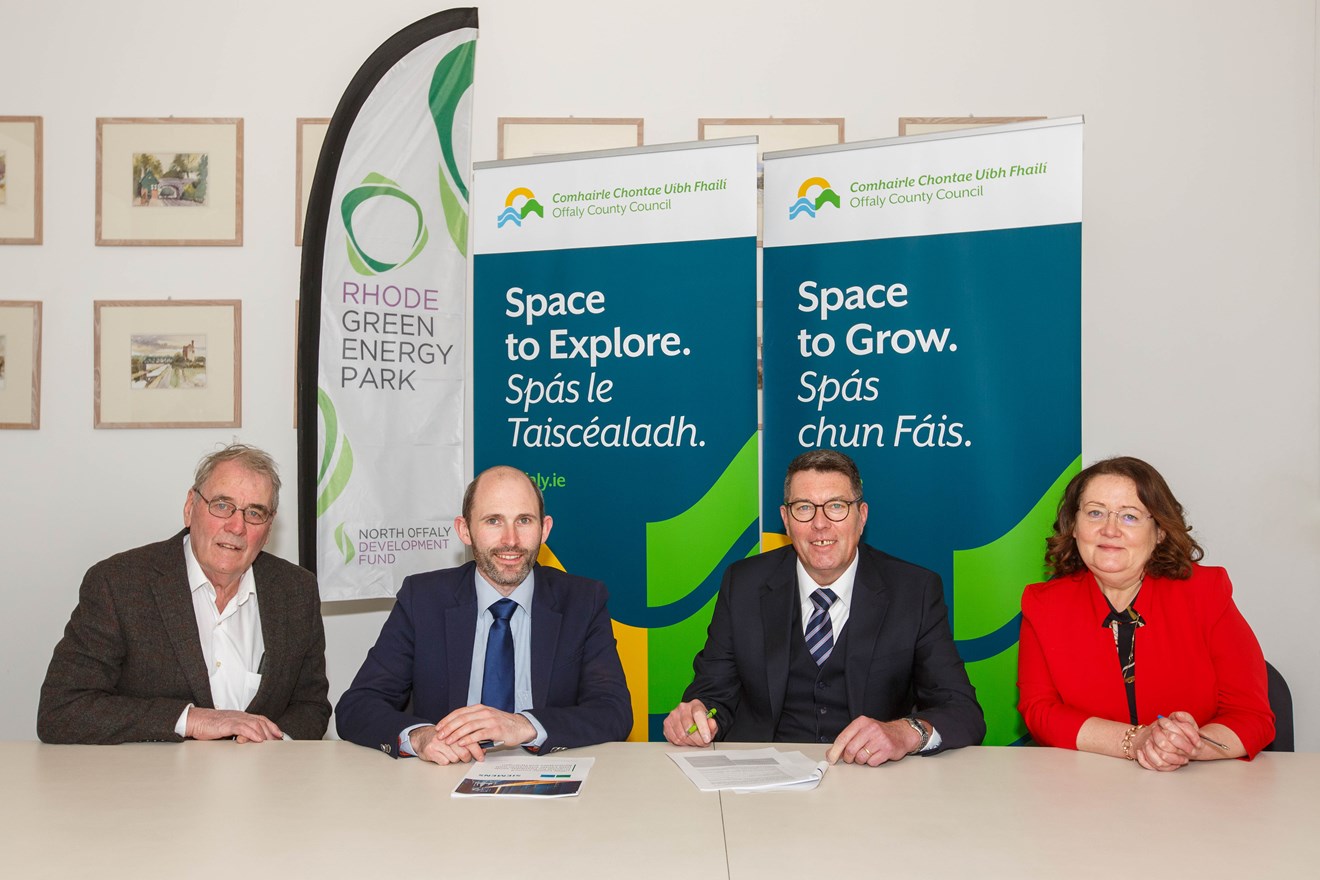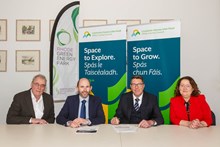Siemens employs more than 600 people in Ireland and has facilities in Glasnevin, Shannon, Swords and Letterkenny.
Contact for Siemens Limited, Ireland:
Michael O'Connor
Email: oconnor.michael@siemens.com
phone: +353 86 7813430
Picture caption:
Left to right:
Eugene Mulligan, Chair NODF
Councillor Liam Quinn, Offaly County Council
Joe Walsh, General Manager, Siemens Limited
Anna-Marie Delaney, Chief Executive, Offaly County Council
Background
The Just Transition Mechanism (JTM) is a key tool to ensure that the transition towards a climate-neutral economy happens in a fair way, leaving no one behind. It provides targeted support to help mobilise at least €65-75 billion over the period 2021-2027 in the most affected regions, to alleviate the socio-economic impact of the transition.
The National Just Transition Fund (JTF) is a key pillar of the Government’s plan for the Midlands region. A fund was made available in 2020 to support communities transitioning to a low carbon economy.
The objective of the Fund is to facilitate innovative projects that contribute to the economic, social and environmental sustainability of the Wider Midlands region (including East Galway, Kildare, Laois, Longford, North Tipperary, Offaly, Roscommon and Westmeath) and have significant employment and enterprise potential. Offaly is particularly affected as the region transitions away from peat as an energy source.
Offaly County Council (as lead Applicant) and North Offaly Development Company (as partner) have been awarded €75,000 in funding under Just Transition Funding to complete a Research Project / Feasibility Study entitled “Exploring Data Centre Integration with Renewable Energy and Green Hydrogen in the Midlands”.
Offaly County Council and North Offaly Development Fund have previously identified the potential for Data Centre co-location with renewable projects planned and constructed, as outlined in an Opportunity Assessment available at: https://www.offaly.ie/eng/Services/Enterprise-Business-Supports/Green-Energy-Technology/Rhode-Opportunity-Assessment.pdf
Offaly County Council & North Offaly Development Fund have received funding from the Just Transition Fund and are at an advanced stage in the development of Rhode Green Energy Park on the site of the former Rhode Power Station.
The recently conducted Eirgrid consultation entitled “Shaping Our Electricity Future “ identified scenarios and opportunities for grid development. Offaly and the wider Midlands has significant potential in this regard, having the transmission infrastructure which previously serviced peat burning Power Stations. Furthermore, the CRU have recently commented that it was likely that data centres would be asked to locate outside of Dublin (where power demand was highest), to locate close to power sources. Offaly Co. Co. has permitted a significant number of renewable energy development and wishes to explore the potential for data centre integration.
It is also notable that Bord na Mona have recently announced (27/09/21) the development of an Energy Park which is considering similar opportunities.
https://www.youtube.com/watch?v=9SWIEu2k36s
Project Goal
One of the leading areas of enterprise growth in Ireland is data centres. There is potential to explore the co-benefits of aligning the energy transition (which is the primary focus of the Rhode Just Transition Project also known as Rhode Green Energy Park) with the transition to a data-driven economy. This can open the opportunity to attract investment in data centres and associated technology-centred enterprise to the Midlands.
In the future data centres will locate where low-carbon energy systems are available. This will give a competitive advantage to a sector increasingly concerned with its carbon footprint and corporate sustainability goals. At Rhode, there is an abundance of renewable energy potential, and the collaborative model for the Green Energy Park can enable waste heat from data centre cooling to be captured and used. However, further research is required to examine how to release this potential of Rhode and the Midlands.
An emerging area of research and innovation at international level is the use of green hydrogen (created from excess renewable energy) as a data centre energy source. This has the potential to provide both very low carbon operation and safe back-up energy storage to support data centres. The development of a green hydrogen demonstration project at Rhode is already being advanced to feasibility stage.
This project would research how best to shape the development of the energy transition project at Rhode to match the data centre sector requirements and ambitions, with a view to attracting significant inward investment and employment creation.
Rhode Green Energy Park
Due to the closure of the power station in Rhode, Co. Offaly the North Offaly Development Fund (NODF) was established with the objective to benefit the community of Rhode and surrounding area. In particular, NODF is intended to assist enterprise creation and development, with the aim of increasing employment and enhancing the economic and social profile in the area. The company received its funding from ESB Networks.
The development of the Rhode Business Park was originally initiated by NODF for enterprise development for the benefit of the local economy and local community. Redevelopment of the site as a Business Park was approximately 90% complete in 2008 when, due to the on-set of the recession this work stopped. NODF had by this time invested €1.8million developing the park and Offaly County Council had invested €0.9 million developing the access infrastructure.
In 2020, Offaly County Council commissioned an Opportunity Assessment Report that reviewed the existing activity in the area with a particular emphasis on green energy and the energy transition. The report identified a number of enterprise and employment opportunities for North Offaly, focussed on the Rhode Green Energy Park.
Offaly County Council subsequently secured close to €1m to completion and transform the park infrastructure, enabling these opportunities to be developed. This will include integration of renewable energy with industrial and business employment.


